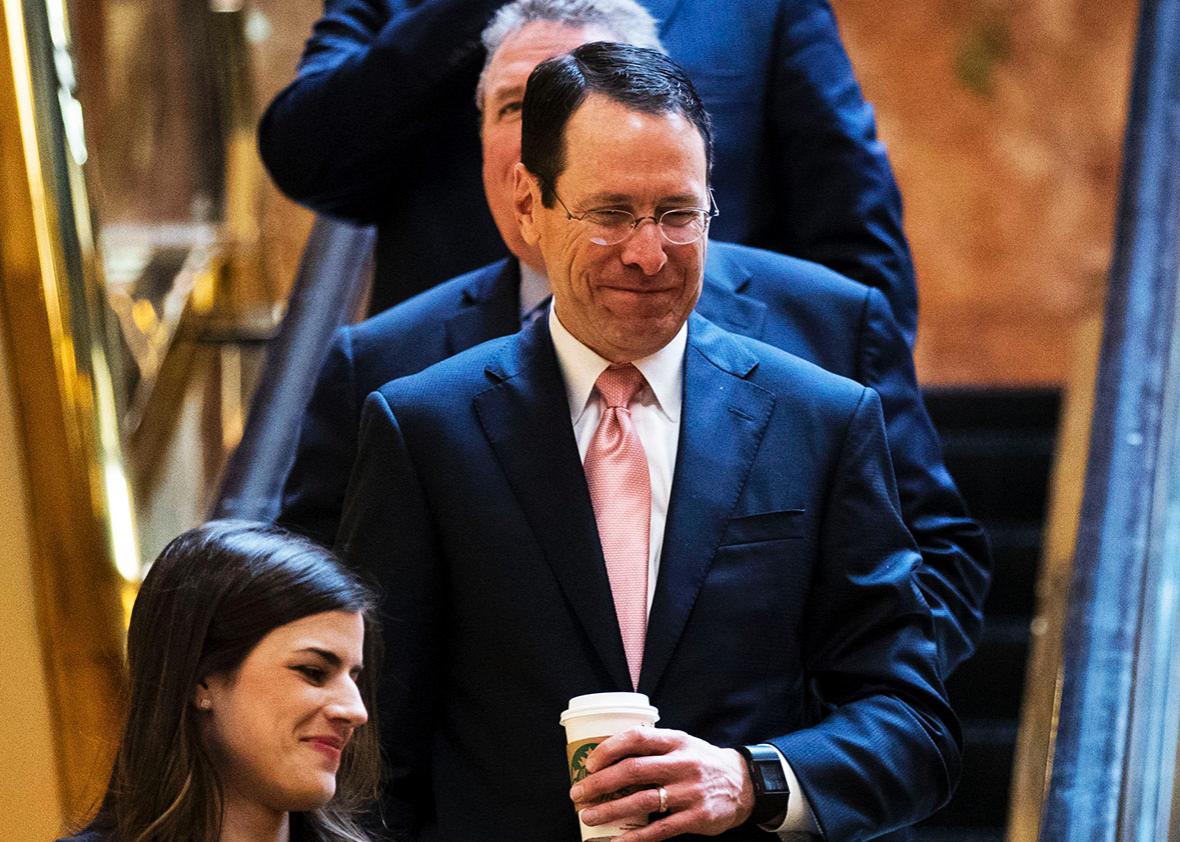In a nearly unprecedented move, President-elect Donald Trump not once but twice this week met with executives of very large firms and their lobbyists whose pending merger deals will require approval by his own antitrust officials. The moves offered evidence that Trump’s antitrust program—and perhaps by extension all of his administration’s white-collar enforcement—may be altogether darker than what we thought even a few days ago.
Antitrust was the focus of a lot of talk this campaign season, to a degree remarkable for a dusty old policy area that had played no explicit role in presidential politics for upward of 70 years. Back when it seemed like Hillary Clinton would win, some offered bubbling optimism for some sort of progressive rebirth of old-school, barn-burning antitrust enforcement, which it was hoped might correct our mounting monopoly problem. November changed all that, but there was at least some hope that Trump’s populism would result in a harder than expected line on antitrust issues. Some even hoped he might be a Teddy Roosevelt–style trustbuster. His campaign rhetoric suggested it, including some specific references to antitrust, and of all things, the Republican Party platform briefly included a strongly worded antitrust plank.
Those hopes faded pretty fast. Trump’s antitrust transition leaders wound up coming from the same business-establishment leadership as his other appointees. But it still seemed briefly like antitrust would at least be in very competent, if conservative, hands. It appeared as though the administration’s handling of the issue would look like what we saw under George W. Bush. Even that now seems uncertain, as Trump’s meetings have muddied the waters on this topic like the actions of no other president in four decades.
For the record, AT&T denies that the merger with Time Warner was discussed in its meeting with Trump, though one rather doubts it—leakers have said otherwise and it seems unlikely given the deal’s prominence in AT&T’s current agenda. In the case of Bayer-Monsanto, the firms themselves confirmed the issue was discussed.
To be clear, these meetings were not in any obvious way illegal. Oddly enough, no one actually knows exactly what a president can do in directing antitrust cases. On the one hand, the Constitution requires presidents to “take care that the laws be faithfully executed,” so they must be free to take some role. But on the other hand, the president’s own personal involvement raises inevitable appearances and risk of actual wrongdoing, as outlined by one Reagan administration antitrust chief. Indeed, presidential involvement is now avoided in antitrust because of a handful of notorious scandals. The first of those scandals occurred when Lyndon Johnson used antitrust law to reward a newspaper for its campaign support. The second took place when Richard Nixon used favorable antitrust treatment to shake down party donors. The latter case drove adoption of federal statutory constraints on Justice Department antitrust enforcement decisions. (Regrettably, the Obama administration appears to have been careless in this area—a ProPublica exposé presented evidence that at a private 2013 meeting between Obama and his former chief of staff Rahm Emanuel, Emmanuel directly lobbied Obama on behalf of two major airlines.* While it has never been proven that the airlines’ then-pending merger was discussed, if that were ever demonstrated, it would be an enduring stain on Obama’s legacy.)
No doubt some will ask what the harm really is of these Trump meetings. At a minimum there is an appearance of serious impropriety, consistent with an emerging theme among Trump’s critics. More substantively, there’s the legitimate fear that mergers might be approved or eased—or made subject to less onerous concessions than would otherwise be the case—because of conflicting interests associated with whatever is discussed in these meetings. The harm might be directly to average Americans, and maybe Trump voters most of all. When mergers are approved that shouldn’t have been approved, average people face higher prices, lower quality, and restricted choice.
The grimmest specific likelihood from this week’s meetings seems to be potential grants of favoritism in exchange for political support, to the president’s party and specifically to the man ultimately responsible for antitrust, attorney general nominee Jeff Sessions. AT&T—like ITT, the firm at issue in the Nixon scandal—is a major Republican Party donor and among Sen. Sessions’ own top contributors. Trump has also openly hinted he would use antitrust to settle his own personal and political vendettas—as when he threatened to bring an antitrust challenge against Amazon to punish Jeff Bezos for criticism of Trump in the Washington Post, a paper that Bezos owns. Such a thing seems possibly to complicate matters here, following Trump’s very public outrage at CNN, an important asset that AT&T hopes to acquire in its purchase of Time Warner.
Less explicitly clear but of obvious concern are Trump’s own pecuniary interests. Because his financial affairs remain complex and not fully known, and because he refuses to divest them, the possibility that his own interests are at stake in these mergers seems very serious.
Finally, this sort of conduct impairs the government’s institutional integrity. Antitrust enforcement is meant to be a simple application of law, mandated by Congress, and it is complex. The president’s role is to see that the intent of Congress is done, not to approve or encourage deals that in his substantive judgment are good or bad. The fact that Trump might even be considering sticking his beak directly in such issues should be a worrying prospect for all Americans.
*Correction, Jan. 17, 2017: This article originally misstated that the meeting was between Obama and airline officials. (Return.)
